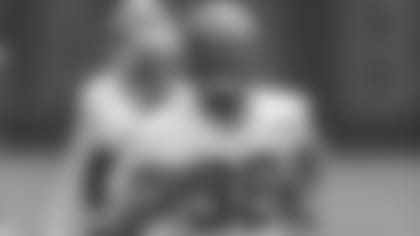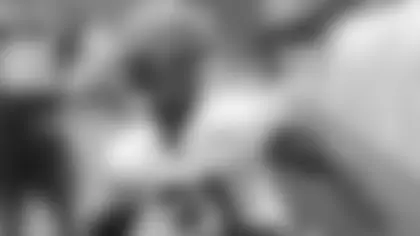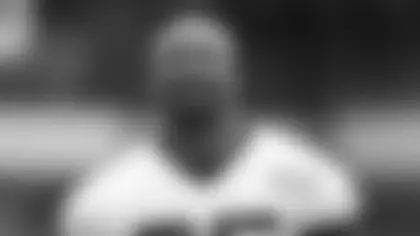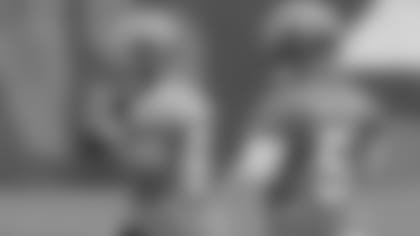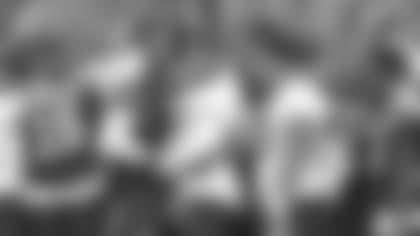Paul Kruger remembers lying in a ditch. He couldn't breathe. He couldn't move. He could barely keep his eyes open.
His siblings gathered around him, on their hands and knees sobbing.
Kruger, then a 13-year-old boy, was about to die.
"My life probably should have been taken," said the Browns outside linebacker.
Kruger's Uncle, Daniel, had just purchased a new Jeep Wrangler and wanted to take Kruger, his sister and two brothers out for a spin. Top down in the breezy spring Utah air. Laughter all around. Nothing could've been better.
But Daniel was just 16 at the time in 1999. As he tried to maneuver the SUV up a steep hill, he lost control of the vehicle. The Jeep started rolling back down the hill, eventually flipping. All five passengers were scattered across the road.
Paul Kruger was thrown the furthest. The still tumbling Jeep was headed right towards him and gaining momentum. In what can be described as slow motion out of a movie, the roll bar of the Jeep landed right on top of Kruger's midsection. At first he wondered if he was paralyzed.
"I remember basically laying on the ground unable to catch my breath at all," said Kruger. "I was definitely in shock. But I remember it all. I never lost consciousness. I just knew it was bad. For me it was a matter of just holding on."
Unbelievably, after rolling at least 10 times, the Jeep was still able to start. More miraculously, nobody else in the car was injured. Daniel raced Paul home and eventually to the emergency room. Kruger's skin color was gray. He immediately went into surgery. One kidney was damaged beyond repair. His spleen was removed. Actually, doctors removed most of Kruger's intestines to assess the damage. He spent two days in a coma and another five days in critical condition.
There were moments when doctors were unsure if the 13-year-old would survive the trauma and internal bleeding.
"The most frightened I have ever been," recalled Kruger's mom Jennifer. "My whole world stopped for a while."
Slowly but surely, Kruger showed signs he would pull through. But it wasn't going to be easy. Bedridden in the hospital for nearly a month, Kruger lost close to 50 pounds. When the time was right, physical therapists stood up Kruger for exercise, but his body had forgotten how to walk.
"It was so crazy to have all your power taken," Kruger said. "I remember trying to gather my steps and just almost falling down."
There were countless days for Kruger of forcing food down and using a walker to move step by step. Kruger remembers being overwhelmed. But the support system of his family kept him strong.
One month after being released from the hospital, Kruger was already angling his parents to let him back on the football field. With some slight hesitation, they did. The fearless Kruger eventually wound up at the University of Utah as a defensive end.
Paul Kruger, now a full-fledged man, remembers being unable to stand up. He reached down underneath his shirt. Not only was blood gushing from his abdomen, Kruger could feel his intestines.
Ironically, again, with some siblings surrounding him, Kruger remembers his life flashing before his eyes.
"The second brush with death… That was just something you could never, ever predict," Kruger said.
It was 2008 and Kruger was hosting his little brother Dave on a recruiting visit at the University of Utah in Salt Lake City. Their sister Jessica and a few friends also tagged along. It was the beginning of a normal Friday evening in college. They briefly stopped by a house party.
The group walked outside on a chilly January night. Some guys drove by talking smack. Kruger knew right away it didn't seem like innocent frat-boy banter. After a few minutes of shouting obscenities, one of Kruger's friends threw a snowball at the car, lighting off a fuse. Kruger unsuccessfully tried to play peacemaker. Before they knew it, approximately 12 suspected gang members charged the Kruger's. It was an all-out brawl and Kruger's team was severely outnumbered.
Dave wound up with a broken nose and a shattered cheekbone. Other gang members used a screwdriver, slicing open the back of one of Kruger's friends. Luckily, those were only minor injuries.
While fighting an attacker on top of him, Kruger felt an incredible nudge on his midsection – almost like a sledgehammer had hit him. Because it wasn't a sharp pain, it took him a moment to realize it: Kruger had been viciously stabbed.
"It felt like I had been burned and punched at the same time," recalled Kruger. "Being stabbed is a hard feeling to describe."
Unable to stand up, Kruger grabbed a handful of his guts. The wound was the size of a tennis ball. He began screaming, dispersing the fight. Kruger remembers his vision being blurred and his sister doing her best to stop the bleeding. An ambulance rushed Kruger to a nearby hospital. The knife wound left Kruger with a collapsed lung and a severed artery. Nine years after the Jeep accident, his life was on the line again.
Doctors cut open his stomach for an intense four-hour surgery. Once they heard the news, Utah players, coaches and even the school's dean lined the hallways of the hospital in the wee hours of the night, distraught they might be losing a brother. Kruger's name was on the bottom line of ESPN's scroll bar. This just didn't seem real. Not again.
This time, it wasn't as bad. Kruger was in the hospital for one week. More than 100 staples were used to sew Kruger's stomach back shut. He'll carry two scars the size of a banana forever.
Kruger could've given up on football. Some people would've. He wasn't able to run for three months. Doctors said it would take close to a year for a full recovery, and still, he might never be the same athlete he was. One of Kruger's first questions after surgery was when he could return the field. That's just who he is.
Yet again, when all odds were against him, Paul Kruger escaped death, and still went on to become one of the best defensive ends in all of college football.
Kruger has a message for those who think their dreams are over – whether it be sickness, bad luck, or even becoming complacent with your life.
"Nothing great comes without adversity," said Kruger. "Look at all the great athletes and leaders in the world. There's always a story behind those people. There's always adversity. These accidents have taught me more than years in school."
When Kruger runs out of the tunnel at FirstEnergy Stadium, he soaks up every moment. He looks around at two teammates butting heads getting excited for the game. He sees fans in the stands wearing his jersey. Kruger knows more than anybody, that being on this earth is a gift.
"It's a precious life and you have to take care of it," Kruger said, with a voice of appreciation. "Now I feel more passionately about what I do, who I'm around. I want the relationships I have to be the most powerful. I want my friendships to be off the charts. I want to be the best brother I can and the best son. I really want to give my all in life."
That's why it was a no-brainer for Paul to start Kruger Care, a foundation to assist individual's children and families that have been devastated by illness, injury and difficult challenges. Kruger and volunteers have done projects like renovating a house for a paralyzed youth football player.
"It's the most rewarding experience I've ever had," said Kruger, a Super Bowl winner with the Ravens in 2013. "The times I've had to be humble and give back to somebody else… Help a child or a family. Those are special times."
Don't ever count yourself out of anything. Paul Kruger never did.




